情态动词讲解
图片预览
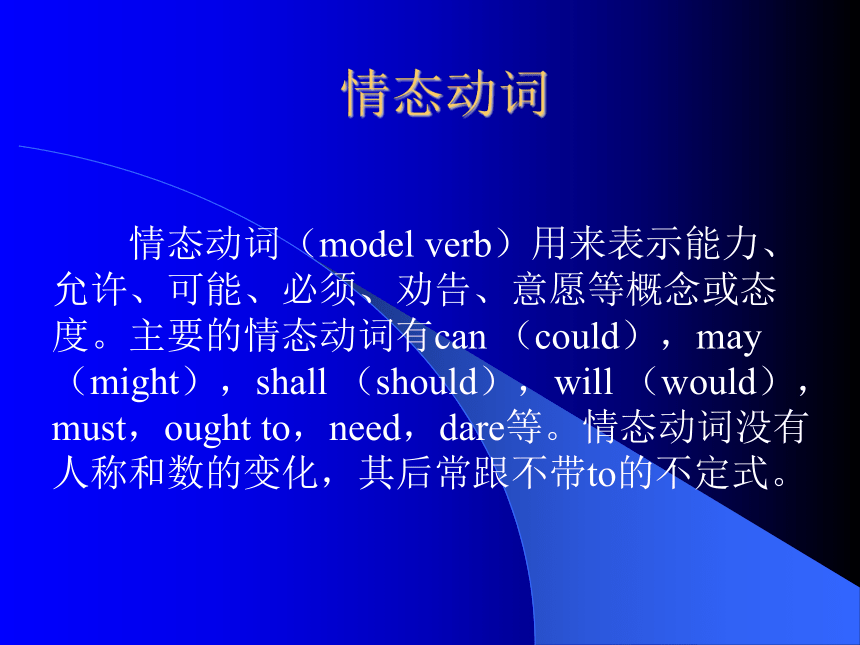
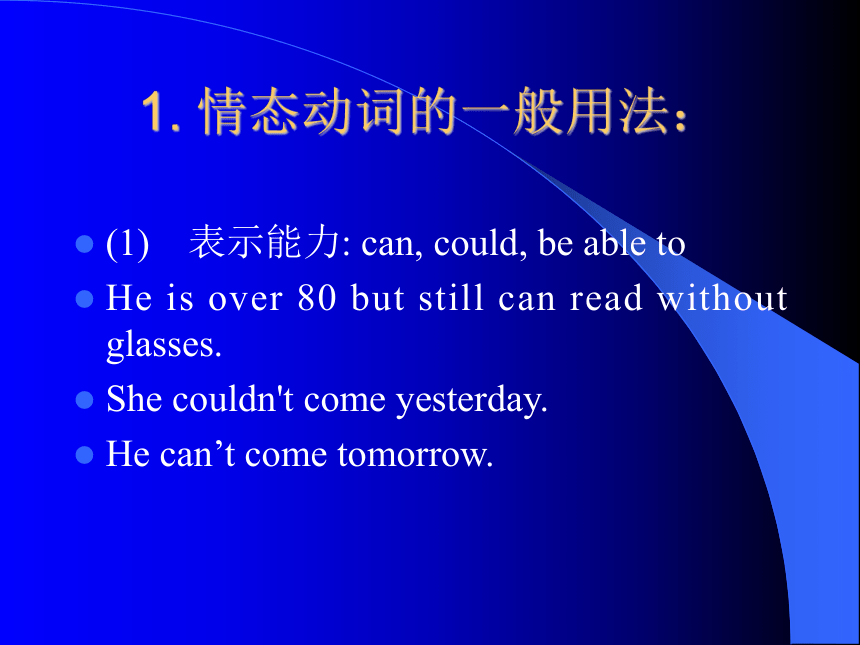
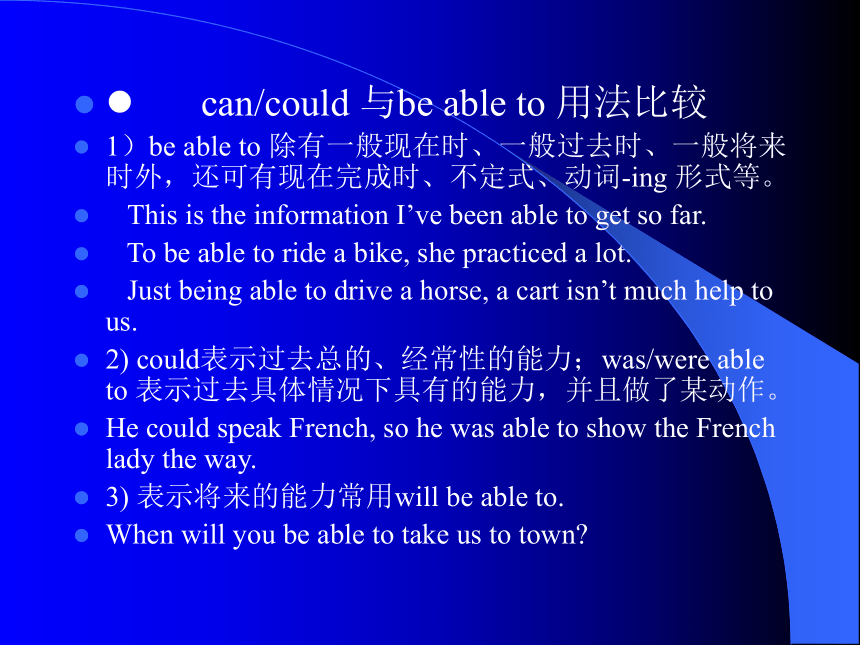
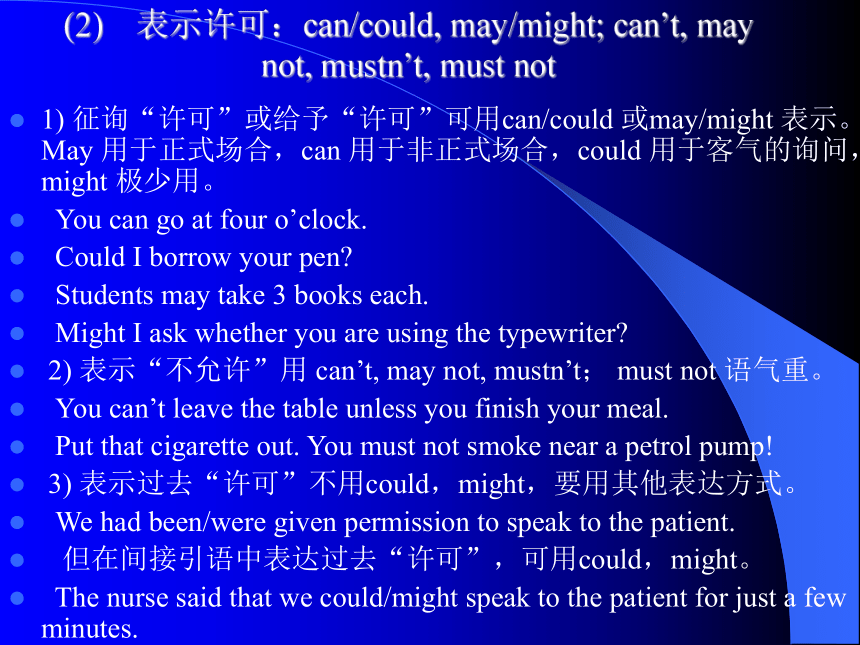


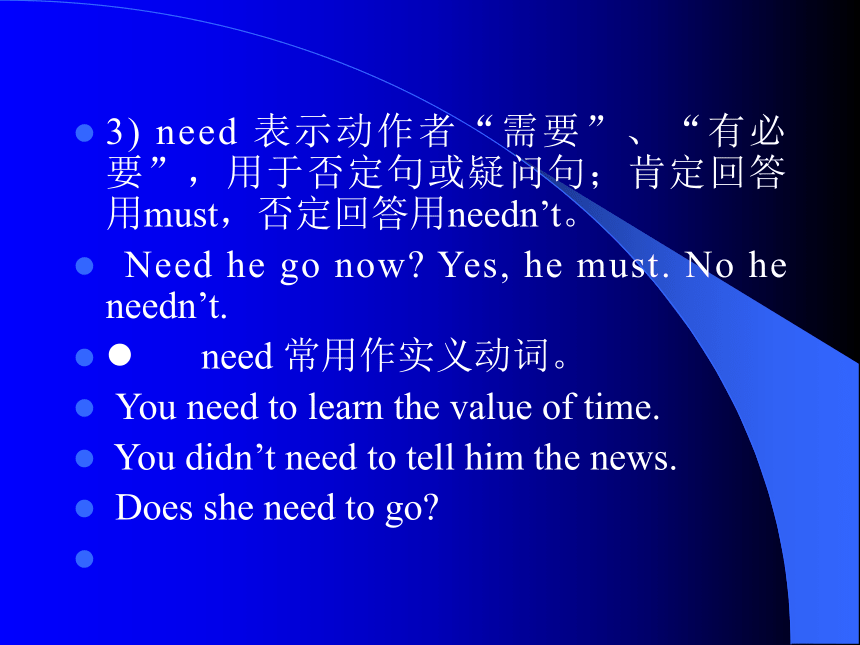
文档简介
(共19张PPT)
情态动词
情态动词(model verb)用来表示能力、允许、可能、必须、劝告、意愿等概念或态度。主要的情态动词有can (could),may (might),shall (should),will (would),must,ought to,need,dare等。情态动词没有人称和数的变化,其后常跟不带to的不定式。
1. 情态动词的一般用法:
(1) 表示能力: can, could, be able to
He is over 80 but still can read without glasses.
She couldn't come yesterday.
He can’t come tomorrow.
l can/could 与be able to 用法比较
1)be able to 除有一般现在时、一般过去时、一般将来时外,还可有现在完成时、不定式、动词-ing 形式等。
This is the information I’ve been able to get so far.
To be able to ride a bike, she practiced a lot.
Just being able to drive a horse, a cart isn’t much help to us.
2) could表示过去总的、经常性的能力;was/were able to 表示过去具体情况下具有的能力,并且做了某动作。
He could speak French, so he was able to show the French lady the way.
3) 表示将来的能力常用will be able to.
When will you be able to take us to town
(2) 表示许可:can/could, may/might; can’t, may not, mustn’t, must not
1) 征询“许可”或给予“许可”可用can/could 或may/might 表示。May 用于正式场合,can 用于非正式场合,could 用于客气的询问,might 极少用。
You can go at four o’clock.
Could I borrow your pen
Students may take 3 books each.
Might I ask whether you are using the typewriter
2) 表示“不允许”用 can’t, may not, mustn’t; must not 语气重。
You can’t leave the table unless you finish your meal.
Put that cigarette out. You must not smoke near a petrol pump!
3) 表示过去“许可”不用could,might,要用其他表达方式。
We had been/were given permission to speak to the patient.
但在间接引语中表达过去“许可”,可用could,might。
The nurse said that we could/might speak to the patient for just a few minutes.
(3) 表示可能性:may/might, can/could, must; can’t
1)may, might 用来推测现在“可能”;may比might表示的可能性大些。
Why isn’t John in class He may/might be sick.
maybe是副词,不是情态动词。Maybe he is sick.
2) 在日常口语中常用can/could 表示“可能”。
You can/could walk for miles in the country without meeting anyone.
Can the news be true No, it can’t be true.
3) must表示可能性最大,“必定”;否定形式用can’t表示“肯定不”、“必定不会”。
You must be hungry after a long walk.
The phone is ringing, but there is no answer. She can’t be at home.
(4)表示必须和需要:must, have to, need
1)must表示说话人认为“必须”;否定回答时用needn’t “不必”。
You must be here at nine o’clock.
Must you go soon No, I needn’t go yet.
2) have to 表示他人或客观情况要求“必须”。
I have to be back at school by eight. I have a lot of work to do tonight.
We don’t have to wear uniforms in school.
l 口语中常用have got to 表示“必须”。
I have got to leave now. I have a meeting in ten minutes.
3) need 表示动作者“需要”、“有必要”,用于否定句或疑问句;肯定回答用must,否定回答用needn’t。
Need he go now Yes, he must. No he needn’t.
l need 常用作实义动词。
You need to learn the value of time.
You didn’t need to tell him the news.
Does she need to go
(5)表示责任和劝告: should, ought to, must, had better
1) 用should和ought to 表示责任和劝告,后者的语气重些
You should/ought to do as you are told.
Such things shouldn't/ought not to be allowed.
2) 有时也用must 表示责任和劝告。
You must see the movie. It’s wonderful.
3) 口语中也常用had better 表示劝告,意为“最好做/不做某事”。
You had better take care of yourself.
You’d better not make a mistake next time.
Hadn’t you better see who is at the door
(6)表示建议:shall,may/might as well, may/might just as well
1) “shall I/we…” 表示征求对方对建议的看法。
Shall we carry the boxes into the house
Let’s go, shall we
2) may/might as well, may/might just as well 表示推荐更佳方案,建议另一种做法,意为“倒不如……”,“……不也一样吗?”。
We may as well stay here tonight.
You might just as well tell the truth.
(7) 表示许诺:shall
shall用于第二、三人称,表示说话人的许诺。
You shall have your money back next week.
If he passes the exam, he shall have a holiday.
(8) 表示意愿:shall, will/would
1) you/he/they shall 表示说话人的强烈意愿,甚至威胁。
You shall pay for this.
They shall do what I tell them to do.
l 在法律条文、规章制度中,shall 表示“必须”。
Each competitor shall wear a number.
2) will/would 表示动作者愿意。
I will lend you the book if you need it.
I won’t do it again.
I have been trying to open the door, but the key won’t turn.
l “will you/would you…” 在下列句中表示客气的建议、询问。
Will you please have a drink
Would you please pass me the salt
Would you like a cup of tea
Would you mind if I opened the window
Would you mind opening the window Would you mind my opening the window
l would 还表示过去的习惯。等于used to
On Sundays he would get up early and go fishing.
(9)表示勇敢:dare
dare 表示“敢于”,用于否定句、疑问句或条件句。
He dare not try.
How dare you open the letter
If you dare say a word, I’ll strike you down.
l dare 还常用作实义动词。
He dare to surf in heavy waters.
l daresay 或 dare say,表示probably, I suppose.
I dare say he will come home late.
2. 情态动词的特殊用法
(1) 情态动词+不定式完成时
1) can/could, may/might, must + have + 动词的过去分词
用于肯定句:表示对过去事件的主观判断,推测过去某动作“可能”、“也许”、“一定”已发生。
Tom could have taken the dictionary. I saw him using it last Sunday.
I can’t find my sunglasses. I may/might have left them at the restaurant yesterday.
You screamed in your sleep last night. You must have had a terrible dream.
用于否定句:表示推测过去某动作“可能”、“也许”、“一定”没有发生。
She couldn't have finished her work so soon.
She may not have seen you.
Dad mustn't have washed the dishes last night.
2) should/ought to + have + 动词的过去分词。
用于肯定句:评论过去“应该做”而实际并未做的动作,意为“本应该”。
I didn't ask her. It’s a pity. You should have asked her. You ought to have asked everyone.
用于否定句:评论过去“不应该做”而实际做了的动作,意为“本不应该”。
I only told Mike. You shouldn't have told anyone. You ought not to have told anyone.
3) needn’t + have + 动词的过去分词
对过去已经发生的动作进行评论,认为“无须发生”,“不必做”。
I needn’t have put on my best suit to go to the party; most of the guests were wearing jeans.
We went to the meeting, but it had been cancelled. Oh, so you needn’t have gone.
(2) 情态动词 + 不定式进行时
表示推测或评论某动作现在是否正在进行。
She may be washing her clothes.
He can’t be working now.
He must be studying in the library.
They shouldn't be watching TV now. They should be doing homework.
(3) 情态动词 + 不定式完成进行时
情态动词 + have been + 动词的现在分词,表示推测或评论过去某动作是否正在进行或一直在进行。
He may have been buying stamps in the post office when you saw him.
She must have been working then.
She should have been attending a meeting yesterday morning.
They shouldn't have been chatting while working.
情态动词
情态动词(model verb)用来表示能力、允许、可能、必须、劝告、意愿等概念或态度。主要的情态动词有can (could),may (might),shall (should),will (would),must,ought to,need,dare等。情态动词没有人称和数的变化,其后常跟不带to的不定式。
1. 情态动词的一般用法:
(1) 表示能力: can, could, be able to
He is over 80 but still can read without glasses.
She couldn't come yesterday.
He can’t come tomorrow.
l can/could 与be able to 用法比较
1)be able to 除有一般现在时、一般过去时、一般将来时外,还可有现在完成时、不定式、动词-ing 形式等。
This is the information I’ve been able to get so far.
To be able to ride a bike, she practiced a lot.
Just being able to drive a horse, a cart isn’t much help to us.
2) could表示过去总的、经常性的能力;was/were able to 表示过去具体情况下具有的能力,并且做了某动作。
He could speak French, so he was able to show the French lady the way.
3) 表示将来的能力常用will be able to.
When will you be able to take us to town
(2) 表示许可:can/could, may/might; can’t, may not, mustn’t, must not
1) 征询“许可”或给予“许可”可用can/could 或may/might 表示。May 用于正式场合,can 用于非正式场合,could 用于客气的询问,might 极少用。
You can go at four o’clock.
Could I borrow your pen
Students may take 3 books each.
Might I ask whether you are using the typewriter
2) 表示“不允许”用 can’t, may not, mustn’t; must not 语气重。
You can’t leave the table unless you finish your meal.
Put that cigarette out. You must not smoke near a petrol pump!
3) 表示过去“许可”不用could,might,要用其他表达方式。
We had been/were given permission to speak to the patient.
但在间接引语中表达过去“许可”,可用could,might。
The nurse said that we could/might speak to the patient for just a few minutes.
(3) 表示可能性:may/might, can/could, must; can’t
1)may, might 用来推测现在“可能”;may比might表示的可能性大些。
Why isn’t John in class He may/might be sick.
maybe是副词,不是情态动词。Maybe he is sick.
2) 在日常口语中常用can/could 表示“可能”。
You can/could walk for miles in the country without meeting anyone.
Can the news be true No, it can’t be true.
3) must表示可能性最大,“必定”;否定形式用can’t表示“肯定不”、“必定不会”。
You must be hungry after a long walk.
The phone is ringing, but there is no answer. She can’t be at home.
(4)表示必须和需要:must, have to, need
1)must表示说话人认为“必须”;否定回答时用needn’t “不必”。
You must be here at nine o’clock.
Must you go soon No, I needn’t go yet.
2) have to 表示他人或客观情况要求“必须”。
I have to be back at school by eight. I have a lot of work to do tonight.
We don’t have to wear uniforms in school.
l 口语中常用have got to 表示“必须”。
I have got to leave now. I have a meeting in ten minutes.
3) need 表示动作者“需要”、“有必要”,用于否定句或疑问句;肯定回答用must,否定回答用needn’t。
Need he go now Yes, he must. No he needn’t.
l need 常用作实义动词。
You need to learn the value of time.
You didn’t need to tell him the news.
Does she need to go
(5)表示责任和劝告: should, ought to, must, had better
1) 用should和ought to 表示责任和劝告,后者的语气重些
You should/ought to do as you are told.
Such things shouldn't/ought not to be allowed.
2) 有时也用must 表示责任和劝告。
You must see the movie. It’s wonderful.
3) 口语中也常用had better 表示劝告,意为“最好做/不做某事”。
You had better take care of yourself.
You’d better not make a mistake next time.
Hadn’t you better see who is at the door
(6)表示建议:shall,may/might as well, may/might just as well
1) “shall I/we…” 表示征求对方对建议的看法。
Shall we carry the boxes into the house
Let’s go, shall we
2) may/might as well, may/might just as well 表示推荐更佳方案,建议另一种做法,意为“倒不如……”,“……不也一样吗?”。
We may as well stay here tonight.
You might just as well tell the truth.
(7) 表示许诺:shall
shall用于第二、三人称,表示说话人的许诺。
You shall have your money back next week.
If he passes the exam, he shall have a holiday.
(8) 表示意愿:shall, will/would
1) you/he/they shall 表示说话人的强烈意愿,甚至威胁。
You shall pay for this.
They shall do what I tell them to do.
l 在法律条文、规章制度中,shall 表示“必须”。
Each competitor shall wear a number.
2) will/would 表示动作者愿意。
I will lend you the book if you need it.
I won’t do it again.
I have been trying to open the door, but the key won’t turn.
l “will you/would you…” 在下列句中表示客气的建议、询问。
Will you please have a drink
Would you please pass me the salt
Would you like a cup of tea
Would you mind if I opened the window
Would you mind opening the window Would you mind my opening the window
l would 还表示过去的习惯。等于used to
On Sundays he would get up early and go fishing.
(9)表示勇敢:dare
dare 表示“敢于”,用于否定句、疑问句或条件句。
He dare not try.
How dare you open the letter
If you dare say a word, I’ll strike you down.
l dare 还常用作实义动词。
He dare to surf in heavy waters.
l daresay 或 dare say,表示probably, I suppose.
I dare say he will come home late.
2. 情态动词的特殊用法
(1) 情态动词+不定式完成时
1) can/could, may/might, must + have + 动词的过去分词
用于肯定句:表示对过去事件的主观判断,推测过去某动作“可能”、“也许”、“一定”已发生。
Tom could have taken the dictionary. I saw him using it last Sunday.
I can’t find my sunglasses. I may/might have left them at the restaurant yesterday.
You screamed in your sleep last night. You must have had a terrible dream.
用于否定句:表示推测过去某动作“可能”、“也许”、“一定”没有发生。
She couldn't have finished her work so soon.
She may not have seen you.
Dad mustn't have washed the dishes last night.
2) should/ought to + have + 动词的过去分词。
用于肯定句:评论过去“应该做”而实际并未做的动作,意为“本应该”。
I didn't ask her. It’s a pity. You should have asked her. You ought to have asked everyone.
用于否定句:评论过去“不应该做”而实际做了的动作,意为“本不应该”。
I only told Mike. You shouldn't have told anyone. You ought not to have told anyone.
3) needn’t + have + 动词的过去分词
对过去已经发生的动作进行评论,认为“无须发生”,“不必做”。
I needn’t have put on my best suit to go to the party; most of the guests were wearing jeans.
We went to the meeting, but it had been cancelled. Oh, so you needn’t have gone.
(2) 情态动词 + 不定式进行时
表示推测或评论某动作现在是否正在进行。
She may be washing her clothes.
He can’t be working now.
He must be studying in the library.
They shouldn't be watching TV now. They should be doing homework.
(3) 情态动词 + 不定式完成进行时
情态动词 + have been + 动词的现在分词,表示推测或评论过去某动作是否正在进行或一直在进行。
He may have been buying stamps in the post office when you saw him.
She must have been working then.
She should have been attending a meeting yesterday morning.
They shouldn't have been chatting while working.
